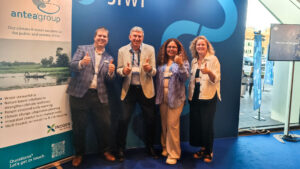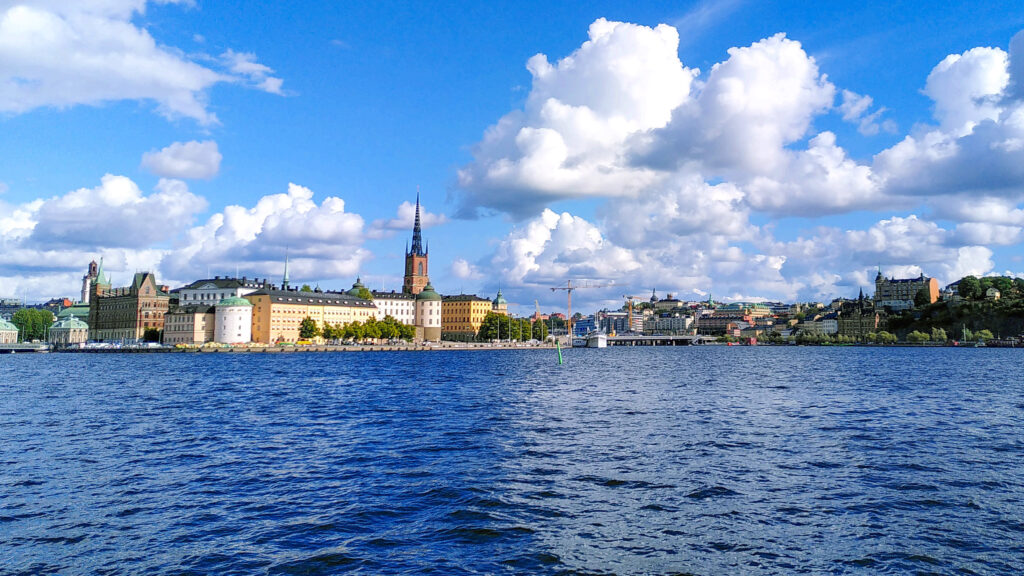“When the forest is green,
the water is blue”
Mina Guli (Run Blue), World Water Week 2023, Stockholm
It’s very simple. Water is not a standalone component of our planet, but it is an integral part of it. That’s been the red line through the World Water Week in August 2023. It is an annual conference where NGOs, universities, governments and private sector come together to learn and share ideas and insights on water, and (re)connect with people and organisations to ignite new collaborations.
So Join For Water was very happy to attend the conference this year to represent our entire community of dedicated colleagues and partners from across the world. Aside from extending our network and renewing existing connections, the conference inspired and motivated us to continue our work on water source protection and access to water in all its dimensions.
Strangely enough, even though this was a water conference, it was not about water… or at least not about water as a resource. Instead, it was all about how water is a connector. Water connects people and water connects land. So, let’s unpack what we have learned about those two things.
Water and people
From the onset of the conference, the importance was highlighted of recognizing and respecting communities’ knowledge and needs whenever we deal with water. Throughout the week, stakeholder involvement has been put forward as being key in understanding and managing water, not only as a resource, but also its many other functions. This ensures that communities, companies and governments can take ownership and responsibility in managing their water and environment.
For Join For Water, this is not a new insight. Throughout decades of working across the world, we and our partners have indeed learned the importance of stakeholder engagement, and we try to implement it in every aspects of our work. We say ‘try’, because it is not easy. Yet, we felt strengthened by the experiences of others shared during the conference: there is no magic formula. One thing is clear though: it goes beyond organising stakeholder consultation meetings just to ‘check the box’ on it.
From presentations from a range of organisations1 and our own experiences, we identified 4 main barriers to effective stakeholder engagement:
- Time: To do stakeholder engagement well, we need time. However, especially in the development sector, projects are often short-term and resources limited (and focussed on ‘implementation’). There is a need to build-in more time into projects to effectively engage stakeholders from start to finish.
- Capturing results: the process of including stakeholder views and ideas into projects is difficult to measure, and therefore difficult to capture into indicators used to monitor progress. There is a need to re-think how stakeholder engagement can be included into monitoring frameworks.
- Representation: even if intensive workshops and meetings are held, there is still a risk that certain groups are underrepresented, such as women, youth, indigenous peoples, and people with disabilities. Special attention to create enabling environments for those groups to participate guarantees no one is left behind.
- Communication: the importance of the way we communicate about water is underestimated. Several speakers demonstrated that good stories and clearly explained facts are incredibly important to ensure effective engagement and participation of a diverse range of stakeholders.
Join For Water Andes
As part of the multi-year programme called CUIDAR, our partner Protos Andes is leading in the development and continuous support of an official stakeholder platform on water for the transboundary river basin Mayo-Chinchipe in Ecuador and Peru. Linked to this platform, they are designing a binational water fund, which aims to pool resources of governments and private companies to enable water source protection initiatives across both sides of the border.
Join For Water Uganda
In 2023 and 2024, Join For Water is piloting a project on Women River Ambassadors (WORIAs) aiming at enabling women groups to better participate in the management of riparian zones.

Water and land
Water is more than the wet substance we drink every day. As said by the quote in the beginning of the article, water is also in the ‘green’ of our planet. In fact, almost all human freshwater needs are linked to the green part of the planet, which includes wetlands, rivers, forests, mountains, etc. It is thanks to these ecosystems we have access to fresh water, but they also help us be resilient against the impacts of drought and floods by holding vast quantities of water in their soils.
What really came out during the conference, was the urgent need to protect freshwater ecosystems not only to protect our water resources but also to mitigate and adapt to the effects of climate change. Not surprisingly, wetlands and river basins were most often mentioned: wetlands are the fastest degrading ecosystems in the world (IUCN) and transboundary river basins provide over 60% of the world freshwater flows. However, water is currently underrepresented in climate planning at national and international levels, emphasizing the need to ramp up advocacy efforts and developing tools to support the process (e.g. the Water Tracker for National Climate Planning).
Join For Water DR Congo
Wetlands and rivers gained a lot of attention during the World Water Week, yet (rain)forests are at least as important for our freshwater than other ecosystems, and play an important role in regulating the climate system. Therefore, Join For Water supports partners in DRC to protect rainforest.
Join For Water All countries
We use our collective experiences to advocate for the importance of water in social-ecological resilience (sustainable development and climate adaptation).
Conclusion
In short, we are faced with enormous water challenges which cannot be underestimated. Yet, the conference showcased numerous great initiatives, repeatedly echoing the call for collective action. Companies, NGOs and governments increasingly unite via river basin organisations, water stewardships and new partnerships such as the Source Water Protection Partnership for Africa.
At Join For Water, we embrace collective action by supporting a diverse range of partners and sharing valuable lessons. We contribute to tangible improvements in the lives of communities across Europe, Africa, and South America. And through knowledge dissemination and collaboration, we feed into international initiatives extending beyond the countries where we work.
Links and materials
- Organisations including Alliance for Global Water Adaptation, Wetlands International, Resilient Cities Network, International Commission for the Protection of the Danube River.
- Read more about our community of practice on developing mechanisms to support projects aiming to create a sustainable link between water source protection and water provision. Download the policy briefs.

